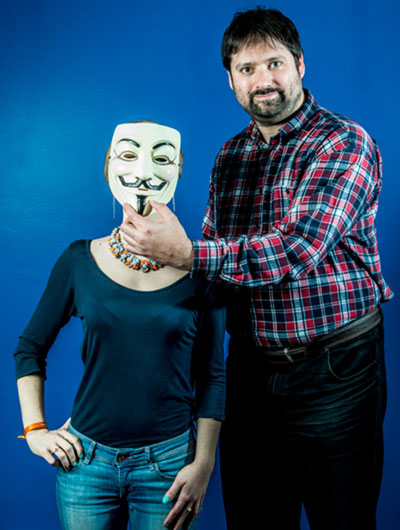by Florian Dold and Christian Grothoff (Inria)
GNU Taler is a new digital payment system currently under development at INRIA. It aims to strike a balance between radically decentralised technologies – such as Bitcoin -- and traditional payment methods, while satisfying stricter ethical requirements, for example customer privacy, taxation of merchants and environmental consciousness through efficiency. GNU Taler also addresses micropayments, which are infeasible with currently used payment systems owing to high transaction costs.
Addressing the problem of micropayments is urgent. The overwhelming majority of online journalists, bloggers and content creators currently depend on advertisement revenue for their income. The recent surge of ad-blocking technology is threatening to destroy this primary source of income for many independent online journalists and bloggers. Furthermore the existing advertisement industry is based on the Big Data business model, and users do not only pay with their attention but also with private information about their behaviour. This threatens to move our society towards post-democracy [1]. Our goal is to empower consumers and content creators by offering the choice to opt for micropayments instead of advertisements.

Christian Grothoff
Unlike many recent developments in the field of privacy-preserving online payments, GNU Taler is not based on blockchain technology, but on Chaum-style digital payments [2] with additional constructions based on elliptic curve cryptography. Our work addresses practical problems that plagued previous incarnations of Chaum-style digital payments. The system is entirely composed of free software components, which facilitates adoption, standardisation and community involvement.
From the consumer’s perspective, GNU Taler’s payment model comes closer to the expectations one has when paying with cash than with credit cards. Customers do not need to authenticate themselves with personally identifying information to the merchant or the payment processor. Instead, individual payments are authorized locally on the customer’s computing device. This rules out a number of security issues associated with identity theft. We expect that this will also lower the barrier for online transactions due to the lower risk for the customer. With current payment solutions, the risk of identity theft accumulates with every payment being made. With our payment system, the only risk involved with each individual payment is the amount being paid for that single transaction.
In GNU Taler, the paying customer is only required to disclose minimal private information (as required by local law), while the merchant’s transactions are completely transparent to the state and thus taxable. Taxable merely means that the state can obtain the necessary information about the contract to levy common forms of income, sales or value-added taxes, not that the system imposes any particular tax code. When customers pay, they use anonymised digital payment tokens to sign a contract with the merchant. The digitally signed contract is proposed by the merchant and is supposed to contain all the information required for taxation – which typically excludes the identity of the customer. Later, the state can obtain the contract by following a chain of cryptographic tokens, starting from a token in the wire transfer from the GNU Taler payment system operator to the merchant. The payment system operator only learns the total value of a contract, but no further details about the contract or customer.
To pay with GNU Taler, customers need to install an electronic wallet on their computing device. Once such a wallet is present, the fact that the user does not have to authenticate to pay fundamentally improves usability. We are already seeing today that electronic wallets like GooglePay are being deployed to simplify payments online. However, the dominant players mostly simplify credit card transactions without actually improving privacy or security for citizens. GNU Taler is privacy-preserving free software and both technically and legally designed to protect the interests of its users.
We plan to use GNU Taler as the basis for future research that investigates censorship-resistant news distribution in decentralised social networks. In addition to online payments, we eventually want to adapt GNU Taler to mobile payments with NFC-enabled devices. We hope that mobile Taler payments will further the proliferation of local currencies (such as the Abeille in France), which are currently popular in parts of Europe, but suffer from practical problems such as easy counterfeiting and the limitation to physical coupons.
GNU Taler was started at TU Munich in April 2014 and is now being coordinated by the TAMIS team[L1] at INRIA Rennes, with contributions from the free software community at large and the GNUnet project[L2] in particular. The initial research is being funded by ARED and the Renewable Freedom Foundation [L3], but we plan to launch a startup to drive the commercial adaptation of the technology. We encourage readers to try our prototype for GNU Taler at https://demo.taler.net/.
Links:
[L1] https://www.inria.fr/en/teams/tamis
[L2] https://gnunet.org/
[L3] https://renewablefreedom.org/
References:
[1] R. Stallman: "How Much Surveillance Can Democracy Withstand?." Wired, Oct. 2013, http://www.wired.com/2013/10/a-necessary-evil-what-it-takes-for-democracy-to-survive-surveillance/
[2] Chaum et al.: "Untraceable electronic cash", in Proc. on Advances in cryptology, Springer-Verlag New York, Inc., 1990.
Please contact:
Florian Dold
Inria, France
+33 2 99 84 25 66
Christian Grothoff
Inria, France
+33 2 99 84 71 45











